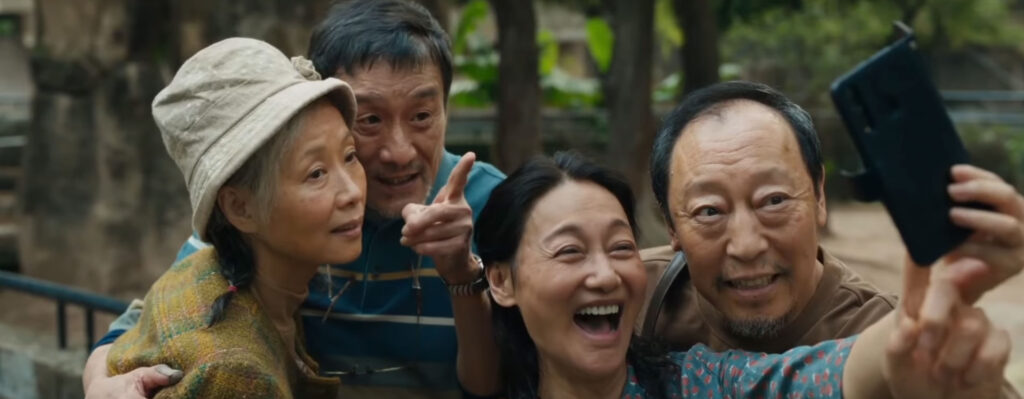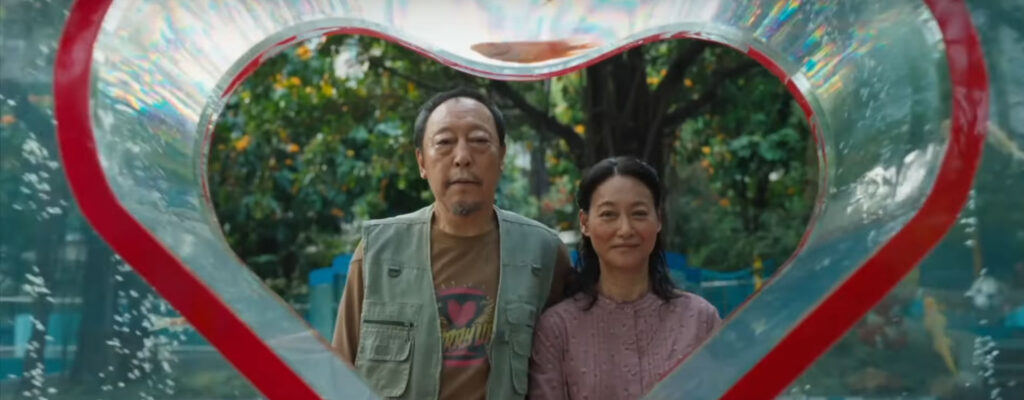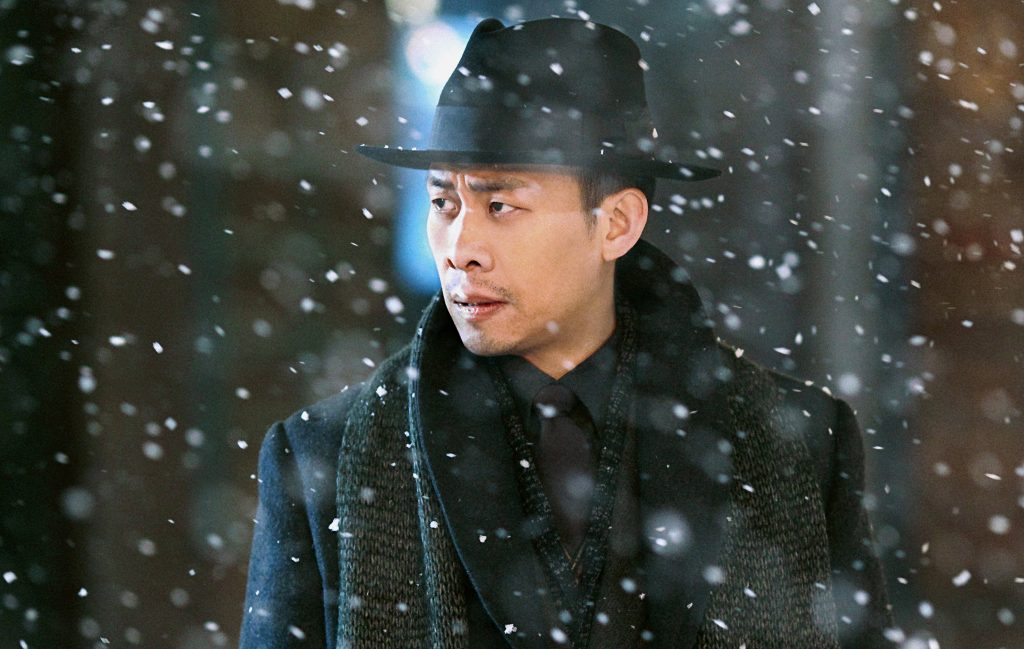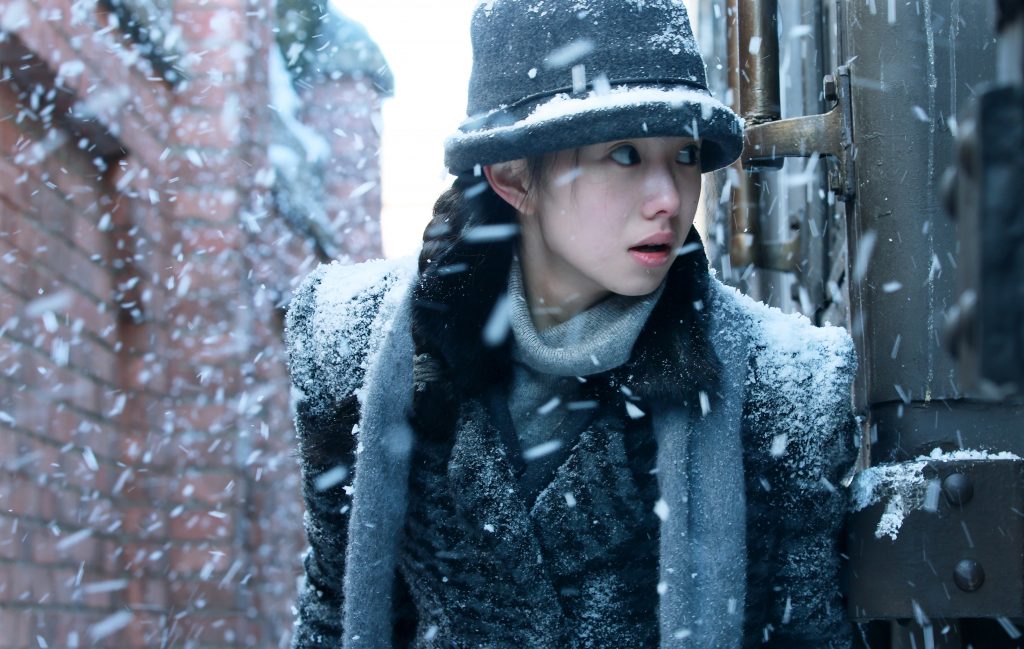July 14, 2023
by Carla Hay

Directed by Han Yan
Mandarin with subtitles
Culture Representation: Taking place in an unnamed part of China, the dramatic film “Love Never Ends” features an all-Asian cast of characters representing the working-class and middle-class.
Culture Clash: Four elderly people navigate romantic love as couples while facing challenges over health and grief.
Culture Audience: “Love Never Ends” will appeal primarily to people who are interested in watching dramas about romance among people in the later stages of their lives.

“Love Never Ends” is a sometimes-uneven but ultimately well-acted drama about finding love later in life. The movie is occasionally repetitive, but the story is compelling enough to maintain viewer interest. Although the movie’s tone overall is serious, there are occasional moments of levity that brighten up a story dealing with some depressing subject matter.
Directed by Han Yan, “Love Never Ends” is based on Kang Full’s comic book “I Love You.” Cheng Li wrote the adapted screenplay for “Love Never Ends.” The movie (which takes place in an unnamed city in China) is about four different elderly people, but the person whose perspective is shown the most is an eccentric widower named Chang Weije (played by Ni Dahong), who is a retired zoo maintenance worker. Weije has been a widower for the past 10 years. His wife also used to work at the same zoo.
The movie begins with a scene of Weije being told during a visit with a doctor that Weije has hyperthyroidism, a condition that causes a thyroid to make and release high levels of thyroid hormone. Symptoms of hyperthyroidism include weight loss, increased appetite, rapid heart beat, sweating, shaky hands, muscle weakness and anxiety. Weije keeps this diagnosis a secret from most people he knows.
Weije lives in an area that could be considered working-class poor. The apartment buildings are run-down, and there’s a lot of garbage strewn over the area. Weije is familiar to many people in the community because he stands out: He likes to wear a long-sleeved black Nirvana shirt, and he likes to use a whip in public for no other reason than to show he can crack a whip. He doesn’t use a whip to scare or harm people but to show that he’s agile enough to use a whip.
Weije has another health problem besides hyperthyroidism. He also abuses alcohol. Although it’s never really said if he’s a full-blown alcoholic, his alcohol abuse has become detrimental to his health and to many of his relationships with people. Weije has an adult son and an adult daughter who know about Weije’s drinking problem, and they worry about his getting arrested for doing something illegal while he’s drunk. Certain people in the neighborhood want to see Weije arrested because they think he’s a nuisance who can be reckless.
Early on on the story, Weije meets Li Huiru (played by Kara Wei), a feisty widow who’s about the same age as he is. Wei is a caretaker and a tenant of an elderly woman named Qui Huaxing (played by Cecilia Yip Tung, also known as Cecilia Yip), who is living with dementia and sometimes uses a wheelchair. Huaxing’s devoted husband Xi Dingshen (played by Leung Ka Fai Tony) is very attentive to Huaxing, but he is feeling the strain of he health issues.
“Love Never Ends” shows how the relationships between these four people evolve over time. Weije gets to know Huiru better, and a romance gradually develops between them. Huiru confides in Weije that she’s ashamed that she and Dingshen often have to collect gabarge to recycle for small amounts of money.
Eventually, Weije starts to help take care of Huaxing when he sees her. Dingshen starts to rely on Weije to help with the physical aspects of taking care of Huaxing. For example, in a scene where Huaxing accidentally falls down outside, Dingshen yells at Weije (who was nearby during this fall) for not helping Huaxing get up right away.
In their own ways, Weije and Huiru are grieving over their deceased spouses and are reluctant to get involved in a serious romance with anyone else. They also feel that they’re too old to fall in love again. It’s a myth that is often perpetuated by society that often thinks of elderly people as people who are just passing time until they die.
The ups and downs of being in love with someone who has serious health issues are handled in a mostly realistic and often tender way in “Love Never Ends.” There’s a long stretch of this nearly two-hour movie that is a “will they or won’t they get together” storyline for Weije and Huiru. This part of the story should have been shorter, since it’s very obvious (and also shown in the movie’s trailer) that Weije and Huiru will get together.
“Love Never Ends” is mostly worth watching for the admirable performances of the four main cast members. In addition to the romantic love that the couples have for each other, all four of these characters develop a genuine friendship that is depicted in a refreshingly candid way. Too often, elderly people in scripted movies are presented as people who are mocked or pitied. “Love Never Ends” doesn’t fall into that trap. It’s not a perfect movie, but it handles some of its most difficult topics with charm and grace.
Shanghai Film Group released “Love Never Ends” in select U.S. cinemas and in China on July 7, 2023.


